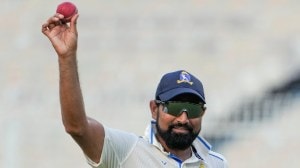Trapped in her mother-in-law146;s shadow
On the day that Mumbai was brought to a grinding halt by relentless rain last week I happened to be switching between news channels when I s...

On the day that Mumbai was brought to a grinding halt by relentless rain last week I happened to be switching between news channels when I stumbled upon Sonia Gandhi8217;s spokesman, Jairam Ramesh, explaining the Employment Guarantee Scheme to a reporter. Soniaji had just addressed her party MPs, he said, and reminded them that this scheme was an old, old Congress idea. It had first been suggested by Indira Gandhi and then by Rajiv Gandhi so it was appropriate that it should now be Soniaji8217;s pet project.
This worried me. Sonia Gandhi, devoted, apolitical daughter-in-law at the time, may not have noticed that her mother-in-law8217;s understanding of economics was limited but there must be people around her now who could point this out. Jairam Ramesh? P Chidambaram? The good doctor himself? Is there nobody who can sit her down on a rainy afternoon and gently explain that one of the main reasons why India is still struggling to end extreme poverty is because mama-in-law had the bizarre idea that it was possible to distribute wealth without creating it. To achieve this she nationalised banks, poured money into the bottomless pit of the public sector, imposed stringent licenses and controls, fined businessmen who produced more than their quotas and succeeded only in distributing poverty as widely as possible. She was helped in this mad exercise by a caboodle of Lefties similar to the bunch that now surround Sonia.
Indira Gandhi may not have been much of an economist but she was an outstandingly clever politician so when she realised that all she had succeeded in doing was redistribute poverty she turned to rhetoric. Gareebi Hatao and the 20-point programme became her new weapons. This was the seventies and India was a very different country so she managed to fool a lot of illiterate people a lot of the time but if you read her 20 points today they sound like the sort of rubbish a schoolgirl might write in a high school essay on economics.
Let me remind you of the first four points. Eradicating poverty. Raising productivity. Reducing income inequalities. Removing social and economic disparities and improving quality of life.
Notice please that eradicating poverty, reducing income inequalities and removing social and economic disparities are different ways of saying the same thing. A noble goal, eradicating poverty, the problem was that nobody least of all Mrs G knew how to go about achieving it, which is why in the two decades that Indira Gandhi ruled, India got left behind by a world that was changing so fast that China and Southeast Asia, economically less developed than us then, raced far ahead. We will need another two decades before we catch up with the poorest of the East Asian tigers.
My fear is that we might need more than 20 years if Sonia and her Marxist consultants continue to come up with grandiose, unworkable and very expensive schemes like the Employment Guarantee Bill that she hopes to push through during this session of Parliament. Guaranteeing employment to jobless people in rural India is as noble an idea as 8216;8216;eradicating poverty8217;8217; and almost as unworkable because central planning has itself proven to be unworkable. All that is likely to result from the exercise is the creation of yet another vast bureaucracy that will end up spending most of the available funds on keeping itself in offices, houses, cars and study tours in foreign lands. The Central Government is already spending more than Rs 40,000 crores a year on similar schemes, and believe me when I tell you that most of this money disappears into the ether long before it gets to the villages. Why listen to me, remember only what Rajiv Gandhi said about his own government8217;s efforts at 8216;8216;eradicating poverty8217;8217;. Less than 15 paise of a rupee spent on eradicating poverty, he said, actually reached the people it was meant for.
Instead of throwing more good money after bad why is nobody teling Sonia to concentrate instead on building rural infrastructure. Roads and an efficient public transport system would go a long way towards opening up employment opportunities for unemployed rural people because they would then be able to look for jobs and sell their wares in the nearest urban centers. Extreme poverty exists mostly where people are unable to escape the wretchedness of their villages.
Wherever the battle against poverty has been won it is usually because roads have brought development, opportunities and the 21st century. In my humble opinion all that will be achieved by guaranteeing a hundred days of employment to those living below the poverty line is that they will continue to remain below the poverty line.
The scheme is of a piece with the 20-point programme and 8216;8216;Gareebi Hatao8217;8217; in an India that has changed and prospered mainly because we stopped wasting our precious resources on re-distributing poverty. When Sonia became a politician it was rumoured that she watched videos of her mother-in-law to copy her mannerisms and her style. She has achieved a similarity in sartorial style now that she has quietly put her shatoosh shawls away and she strides onto public platforms much like the original Mrs G used to and even sounds as shrill in some of her more emotional speeches. Imitation to this point is harmless and understandable. After all there are not many other Indian women politicians that she could use as role models. But, please Sonia, stay away from the economic thoughts of
Indira Gandhi. They were not worth 20 points even in those bad, old poverty-stricken days.
Write to tavleensinghexpressindia.com
- 01
- 02
- 03
- 04
- 05






























